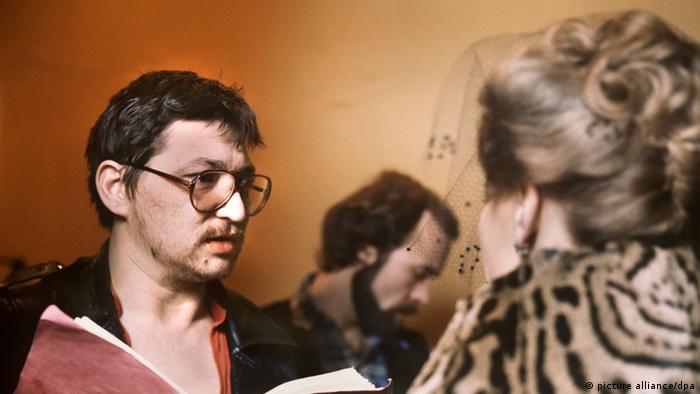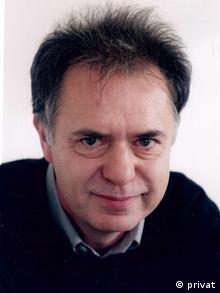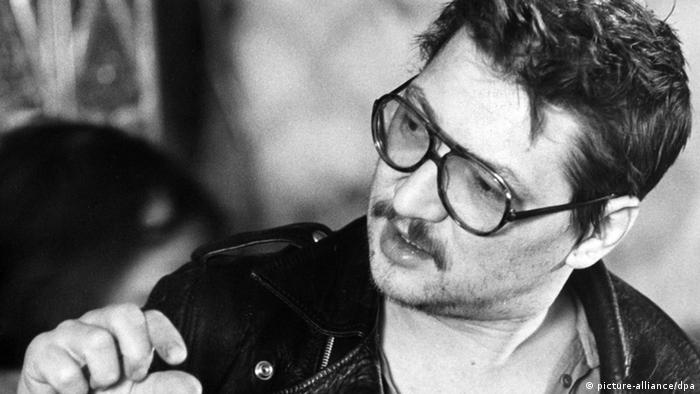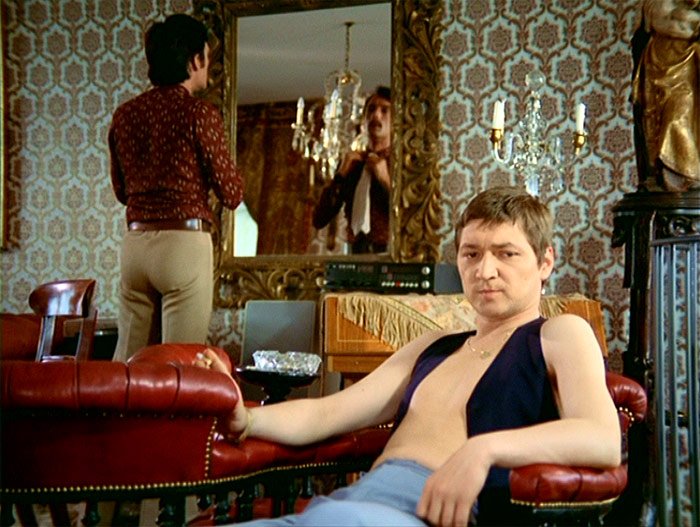What defined filmmaker Rainer Werner Fassbinder
The German director, who was born 75 years ago, was extremely prolific despite his destructive lifestyle. A Fassbinder expert tells DW about how his genius was first recognized abroad

Rainer Werner Fassbinder's significance as a filmmaker is an established fact in Germany, but the country was never too fond of him — especially not of his lifestyle. The director, who died at the age of 37, was extremely prolific during his short life. From 1969 until his death in 1982, he directed over 40 feature films, two TV series, different short films and video productions, and 24 plays.
But work was not his only addiction. His drug and alcohol abuse came at a price, also affecting his popularity in Germany. Local cinephiles were more likely to be fans of the films of Volker Schlöndorff, Werner Herzog and Wim Wenders than Fassbinder's.
A self-taught genius
Still, New German Cinema, the wave of new arthouse directors that revolutionized West German filmmaking in the 1960s, would not be conceivable without Fassbinder.
Born on May 31, 1945 in Bad Wörishofen, Bavaria, Fassbinder never attended a film school, but rather learned to make films on his own. That's perhaps exactly what made him strong and courageous. Fassbinder did whatever he wanted. He didn't allow anyone to meddle in his film projects or his lifestyle, which was significantly shaped by his homosexuality as well. He was always a radical outsider in a bourgeois society.After starting his career in theater as an actor, scriptwriter and director, he made his first feature film, Love Is Colder Than Death,in 1969. Fassbinder was a multitalented genius; he directed films and plays, wrote screenplays and radio dramas, made documentaries and fiction films of all lengths and was also an actor.

40 FILMS IN 13 YEARS: WHY FASSBINDER IS UNFORGETTABLE
Love Is Colder Than Death
Love, death and coolness: These three elements would characterize Rainer Werner Fassbinder's entire life and work. The young Bavarian director was only 23 when his first feature-length film was released in German theaters. "Love Is Colder Than Death" premiered at the Berlinale, Berlin's international film festival, in 1969.
1234567891011121314
A deep understanding of the media
Along with his artistic versatility, Fassbinder always aimed to develop something completely different, points out Michael Töteberg, who wrote different books on the filmmaker. "He created in many different media forms, but always with a specific understanding of each medium," the film expert told DW. He would never make a film out of a play or simply turn a TV series into a film, for instance.

'The Stationmaster's Wife' with Kurt Raab, one of Fassbinder's favorite actors
If he did make two versions of a project for the big and the small screen, such as The Stationmaster's Wife, they differed enormously, adds the author.
The fact that Fassbinder developed a new perspective for each project is what Töteberg finds exciting about his work, even though that's not what he's best remembered for. Once a filmmaker is ranked among the classics, then "a certain image of this person sticks," the film expert says. Fassbinder is mainly known for his cinematic melodramas about German history, and Töteberg observes that anything that doesn't fit in this framework tends to be left aside, even though the director's work was very extensive and diverse.
Breakthrough in Cannes
The film expert believes Fassbinder's significance was recognized earlier abroad than in Germany and that he was probably better understood there as well.

Fassbinder expert Michael Töteberg
Fassbinder celebrated his international breakthrough at the Cannes Film Festival in 1974 with Ali: Fear Eats the Soul, which won different awards there. Töteberg notes that the German's films also received early praise in the US, and it's only following Fassbinder's international success that people in his home country became aware of his artistic genius. Still today, "the image of Germany abroad is clearly shaped by Fassbinder," says the author.
But did Fassbinder's tumultuous lifestyle and drug abuse and his reputation of having an extreme temper on film sets and of insulting friends damage his image as an artist? There is certainly something to it, says Töteberg, who, however, finds that "the cliché of the ingenious monster" isn't particularly helpful to better understand the Fassbinder phenomenon.
A unique perspective on Germany
Fassbinder was way ahead of his time on many issues. Töteberg cites sexuality as an example: "At the time he directed In a Year of 13 Moons (1978), who had actually heard of transsexuals outside of fringe groups?"

Volker Spengler portrays a transsexual woman in the 1978 drama 'In a Year of 13 Moons'
Fassbinder's cinematic take on politics, history and current events was also singular. He could not be defined as part of a specific camp, says Töteberg: "He never did propaganda, whether for left-wing or other politics; he always kept a distanced and critical position to the social movements of his time." In this respect, he didn't have any illusions and wasn't naïve about what was happening in Germany at the end of the 1960s-1970s.
Fassbinder never wanted to live up to expectations: "Whenever he had a commercial success, then the next film he made was a rather disturbing one," says Töteberg. "And when people thought: 'Oh, he's really become an arthouse director now,' then he'd do something for the mainstream. That was his way of being consistent!"
A director to discover and rediscover
Today, 75 years after his birth, there is still a lot about Fassbinder to be discovered. Some of his films disappeared for a long time, in some cases for legal reasons. Some of them have only recently been rediscovered and restored.
Despite his tremendous creative output, the director didn't consider himself a genius at all: "Fassbinder always said: 'I make things out of things. I'm not that productive myself.'" But, Töteberg adds, "the way he seized these things so productively, that's what is fascinating about him."

THE INFLUENTIAL RAINER WERNER FASSBINDER
Early death of a cinema great
Fassbinder is one of the most important film directors of Germany's post-WWII era. He died in 1982 at age 37, yet in his short life span he made 44 movies. While influenced by his predecessors, his films were unique, earning him a place in international cinematic history and influencing a subsequent generation of directors around the world.
PHOTOS 12345678910111213141516
Love, death and coolness: These three elements would characterize Rainer Werner Fassbinder's entire life and work. The young Bavarian director was only 23 when his first feature-length film was released in German theaters. "Love Is Colder Than Death" premiered at the Berlinale, Berlin's international film festival, in 1969.
1234567891011121314
A deep understanding of the media
Along with his artistic versatility, Fassbinder always aimed to develop something completely different, points out Michael Töteberg, who wrote different books on the filmmaker. "He created in many different media forms, but always with a specific understanding of each medium," the film expert told DW. He would never make a film out of a play or simply turn a TV series into a film, for instance.

'The Stationmaster's Wife' with Kurt Raab, one of Fassbinder's favorite actors
If he did make two versions of a project for the big and the small screen, such as The Stationmaster's Wife, they differed enormously, adds the author.
The fact that Fassbinder developed a new perspective for each project is what Töteberg finds exciting about his work, even though that's not what he's best remembered for. Once a filmmaker is ranked among the classics, then "a certain image of this person sticks," the film expert says. Fassbinder is mainly known for his cinematic melodramas about German history, and Töteberg observes that anything that doesn't fit in this framework tends to be left aside, even though the director's work was very extensive and diverse.
Breakthrough in Cannes
The film expert believes Fassbinder's significance was recognized earlier abroad than in Germany and that he was probably better understood there as well.

Fassbinder expert Michael Töteberg
Fassbinder celebrated his international breakthrough at the Cannes Film Festival in 1974 with Ali: Fear Eats the Soul, which won different awards there. Töteberg notes that the German's films also received early praise in the US, and it's only following Fassbinder's international success that people in his home country became aware of his artistic genius. Still today, "the image of Germany abroad is clearly shaped by Fassbinder," says the author.
But did Fassbinder's tumultuous lifestyle and drug abuse and his reputation of having an extreme temper on film sets and of insulting friends damage his image as an artist? There is certainly something to it, says Töteberg, who, however, finds that "the cliché of the ingenious monster" isn't particularly helpful to better understand the Fassbinder phenomenon.
A unique perspective on Germany
Fassbinder was way ahead of his time on many issues. Töteberg cites sexuality as an example: "At the time he directed In a Year of 13 Moons (1978), who had actually heard of transsexuals outside of fringe groups?"

Volker Spengler portrays a transsexual woman in the 1978 drama 'In a Year of 13 Moons'
Fassbinder's cinematic take on politics, history and current events was also singular. He could not be defined as part of a specific camp, says Töteberg: "He never did propaganda, whether for left-wing or other politics; he always kept a distanced and critical position to the social movements of his time." In this respect, he didn't have any illusions and wasn't naïve about what was happening in Germany at the end of the 1960s-1970s.
Fassbinder never wanted to live up to expectations: "Whenever he had a commercial success, then the next film he made was a rather disturbing one," says Töteberg. "And when people thought: 'Oh, he's really become an arthouse director now,' then he'd do something for the mainstream. That was his way of being consistent!"
A director to discover and rediscover
Today, 75 years after his birth, there is still a lot about Fassbinder to be discovered. Some of his films disappeared for a long time, in some cases for legal reasons. Some of them have only recently been rediscovered and restored.
Despite his tremendous creative output, the director didn't consider himself a genius at all: "Fassbinder always said: 'I make things out of things. I'm not that productive myself.'" But, Töteberg adds, "the way he seized these things so productively, that's what is fascinating about him."

THE INFLUENTIAL RAINER WERNER FASSBINDER
Early death of a cinema great
Fassbinder is one of the most important film directors of Germany's post-WWII era. He died in 1982 at age 37, yet in his short life span he made 44 movies. While influenced by his predecessors, his films were unique, earning him a place in international cinematic history and influencing a subsequent generation of directors around the world.
PHOTOS 12345678910111213141516

ESSENTIAL FASSBINDER HIS AUTOBIOGRAPHICAL FANTASY; FOX & FRIENDS
Search Results
Web results
May 9, 2017 - Fassbinder's "Fox And His Friends," a timely homoerotic, ... part of the fool, underlining the absurdity of Eugen's fancy fam and West German liberal ... And besides, the autobiographical parallels to Fassbinder's life ... Classifieds · Place an Ad · Contact us · Privacy Policy · Do Not Sell My Info · TAG disclosure.
Fox and His Friends is unsparing social commentary, an amusingly pitiless and ... Rainer Werner Fassbinder; Germany; 1975; 124 minutes; Color; 1.37:1 ...
FOX AND HIS FRIENDS, Rainer Werner Fassbinder, 1975 ... (Many of the details are autobiographical.) ... documentary “No Maps on My Taps” and the 1943 musical comedy “Stormy Weather,” which features an entire cast of black performers, ..
Aug 21, 2018 - Fassbinder's favourite target is the moral bankruptcy that he saw as prevalent in West ... My subject is the exploitability of feelings, whoever might be the one exploiting them. ... Watch Fox and His Friends online on BFI Player .
Apr 16, 2020 - More Fassbinder on the Criterion Channel: The American Soldier, Berlin ... Fear of Fear, Fox and His Friends, Gods of the Plague, Katzelmacher, Lola, Love Is ... living filmmaker, and this 1992 autobiographical work is his best film. ... Spielberg
HE WAS QUEER AND A SMOKER

10 of the most memorable German film debuts
While many debut films have marked the start of a successful career for some directors, others were quickly forgotten.Here are some of the best debut films by German directors. (23.01.2018)
World-renowned cinematographer Michael Ballhaus dies
Ballhaus was known for his work on Academy Award winning films "Goodfellas" and "The Departed." He also served as the Head of Jury at the 40th Berlinale Film Festival. (12.04.2017)
Revisiting Rainer Werner Fassbinder, the cult director of New German Cinema
Rainer Werner Fassbinder started directing in 1966. It was the beginning of an exceptionally productive career. He would direct 44 works in 17 years. A new comprehensive picture book covers the entirety of his oeuvre. (19.07.2016)
10 Bavarian filmmakers
For many cinema enthusiasts, Munich is Germany's secret film capital — although not everyone in the country would agree. But many great directors were in fact born in Bavaria. Here's 10 great Bavarian film directors. (03.07.2018)

FASSBINDER, BRAD DAVIS, ANDY WARHOL
Date 29.05.2020
Author Jochen Kürten (eg)
Related Subjects Rainer Werner Fassbinder, New German Cinema
Keywords Film, Rainer Werner Fassbinder, New German Cinema
Permalink https://p.dw.com/p/3cr7k
Who was Rainer Werner Fassbinder and why did he become a queer film icon?
06 APR 2017

STEFANIE GERDES
The morning of 10 June 1982, at 3.30 am, Juliane Lorenz entered her bisexual boyfriend’s bedroom uninvited.
She could hear the television, but not her partner’s snoring.
When Lorenz opened the door, she found his lifeless body; he still had a cigarette between his lips, and there was a fine trickle of blood running from one nostril.
His death was later given as cardiac arrest, caused most likely by a deathly mixture of being overworked and cocaine, sleeping pills, and alcohol.
Her partner was acclaimed German director, writer, producer, and actor Rainer Werner Fassbinder. He was one of the most important members of the New German Cinema movement.
Now, London’s BFI have dedicated an entire film festival to the queer filmmaker and his art. Through to 31 May, they are showing a great part of his repertoire, including the classics Fear Eats The Soul, Berlin Alexanderplatz, and queer favorite Querelle.
Throughout his life, Fassbinder was followed by a whole lot of controversy – and his passion for film, which had started young.
Born on 31 May 1945, three weeks after Germany’s unconditional surrender, Fassbinder claimed he was born in 1946 for nearly his entire life. He did so in compliance with his mother’s wishes, because it would enhance her son’s status as a cinematic prodigy.
After his parents divorced, Fassbinder’s mother Liselotte Pempeit raised him as a single parent. Faced with the task of having to support herself and her child she worked as a translator.
To be able to concentrate, she sent Fassbinder to the cinema where he said he saw at least one new film every day, but sometimes as many as three or four.
Because Pempeit suffered from tuberculosis she was often away for long periods of time; during those absences, friends and tenants looked after her son.
But it also made him independent and, as some say, uncontrollable. So much so, he clashed with his mother’s lover as well as his later stepfather.
When he reached his teens, his parents sent him to boarding school. Fassbinder repeatedly attempted to escape, but never succeeded.
Aged just 16 he finally quit school, before his final examinations, and moved to Cologne to live with his father.
Despite dropping out, the teenager continued to educate himself through studying philosophical and psychoanalytic writings, as well as social criticism.
He was already beginning to write plays and poems at the time, as well as short stories. His biggest passion, though, was film.
But getting to the top was hard work.
Fassbinder attended two years of private acting lessons and acting school, yet he failed the national acting exam. He also failed to make it into film school, which prompted him to return to his hometown of Munich to continue his writing.
At the age of 22, Fassbinder finally got a foot in the door when he joined Munich’s Action Theater.
Two months later, he was leading the company. The following year, in April 1968, he directed the premiere of his first independent play, titled Katzelmacher.
It tells the story of a Greek immigrant to Germany who becomes the target of intense racial, sexual, and political hatred for a group of Bavarian slackers.
Another year later, in 1969, a film version of Katzelmacher marked Fassbinders breakthrough as a filmmaker.
It also marked the Action Theater’s end. The group disbanded after one of its founders wrecked the theater, because he was jealous of Fassbinder and how powerful he had become as an artist.
Parts of the ensemble reassembled to form the ne antiteater (anti-theater). Some of them, like Hannah Schygulla, would later become some of Fassbinder’s most important actors.
Fassbinder continued his work, directing 12 plays over the course of 18 months. Four of those were his own works; five more were rewrites.
At the same time, he also continued his film work.
Between 1969 and his death in 1982, Fassbinder produced 41 alternative films, including classics like Jailbait, Fox and His Friends, and Querelle.
The key to his immense output? Fassbinder knew the people, actors as well as technicians, he was working with incredibly well.
The well-oiled machine of a team allowed him to produce four to five films a year, at an extremely low budget.
His films speak of Fassbinder’s stage career, and display similar aesthetics.
On stage, Fassbinder’s work defied tradition and standards. He drew inspiration from musical and cabaret as much as from the student protest movement, especially for his stage work.
In the finished material, it made for a disctinct aesthetic of mixing choreographed movements and static poses. His use of color also became iconic.

While working on films he was not limited to just writing or directing. Instead, Fassbinder taught himself how to do nearly every step in the production process. As a result, he often also served as the composer, producer, production designer and editor of his films.
But wherever he went, controversy followed.
Sometimes, it was because of controversial and provoking remarks he made in interviews.
But very often, it was also sparked by Fassbinder being seen in gay bars in New York, or bath houses in Paris.
In his youth, he identified as gay; later, he had sexual relationships with both men and women.
And he did not keep his professional and personal lives apart. Fassbinder was known for casting friends, family, and lovers in his films.
In some cases, like that of Günther Kaufmann, it was the director’s way of wooing people.
Fassbinder also claimed he opposed matrimony, yet he married Ingrid Caven. Their wedding reception later appeared on screen in The American Solider.
After two years, the couple split. Caven knew about Fassbinder’s sexuality, describing him as ‘a homosexual who also needed a woman. It’s that simple and that complex.’
Like Caven Fassbinder’s female partners, Irm Hermann and Juliane Lorenz, were not disturbed by their husband’s sexual orientation. The three women are often considered the most important women in his life.
In the end, his relentless work ethic led Fassbinder to consume drugs and alcohol, in a bid to sustain himself.
On the night of his death, Fassbinder was working, as usual. He had guest stay over at his apartment, too: Wolf Gremm, who directed Kamikae 1989.
Early in the evening, the filmmaker retired to his bedroom, to work on a future film about Polish-German anti-war activist Rosa Luxemburg.
Shortly after 1 in the morning, he received a phone call from Harry Baer, his friend and assistant.
When Fassbinder was found dead two and a half hours later, the notes for Rosa L were found next to his body.
No comments:
Post a Comment